News
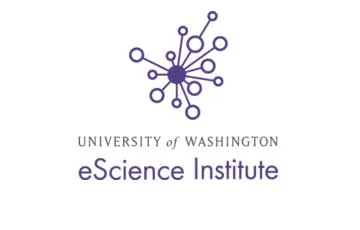
Mon, 11/02/2015
UW to co-lead West Coast ‘Big Data brain trust’ for NSFThe National Science Foundation selected the UW, along with UC San Diego and Berkeley, to co-lead one of four Big Data Regional Innovation Hubs around the country. The ability to access, analyze and draw insights from massive amounts of data is already driving innovation in fields from medicine and manufacturing to the way cities are managed. To accelerate this emerging field, the NSF is establishing four “Big Data brain trusts” to catalyze new collaborations among university researchers, tech companies, national labs, local and state government and non-profits.

Thu, 10/29/2015 | UW Today
Nov. 5 bioengineering lecture focuses on 'Engineering Personalized Medicine'
We have personal trainers and tailored suits. Why don't we have personalized medicine? That question - and the prospects for stem-cell-based treatments that reverse disease and repair damage rather than simply addressing symptoms - will be the focus of UW Bioengineering's 2015 Allan S. Hoffman Lecture on Nov. 5. Molly S. Shoichet, a University of Toronto chemical engineering and applied chemistry university professor who specializes in tissue engineering at the Institute of Biomaterials and Biomedical Engineering, will deliver the lecture entitled "Engineering Personalized Medicine" at 4 p.m. at Kane Hall's Walker-Ames Room, with a reception to follow.
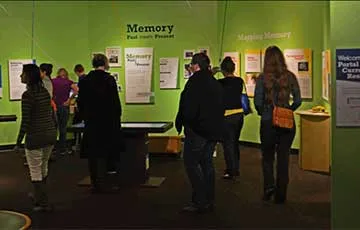
Thu, 10/29/2015 | EE News
Pacific Science Center Exhibit Features Research by EE Professor Howard Chizeck
A new Pacific Science Center exhibit features the work of EE Professor Howard Chizeck and students in the BioRobotics Lab. The exhibit, Memory: Past Meets Present, focuses on how the brain retains information on repetitive actions performed by the body. The exhibit runs through March 6, 2016.
One panel of the exhibit highlights the Deep Brain Stimulator (DBS) for essential tremor project, led by EE Ph.D. students Jeffrey Herron and Margaret Thompson, aims to build closed-loop DBS systems to improve treatment for people with neurological disorders such as essential tremor.

Fri, 10/23/2015 | UW Today
From cell phones to DNA - an exploration of information theoryIn a lecture titled, "The Science of Information: From Pushing Bits over the Air to Assembling the World's Largest Jigsaw Puzzle," Stanford University professor David Tse will focus on how information theory has enabled new technological innovations. The lecture is part of the 2015 Dean Lytle Endowed Lecture Series hosted by the UW’s Department of Electrical Engineering. "While the design of physical systems is based on the laws of physics, the design of communication systems is based on the laws of information theory," said Tse, a professor of electrical engineering. Tse will give a public talk on Monday, Nov. 2, at 3:30 p.m. in the Paul G. Allen Center for Computer Science and Engineering atrium, with a reception to follow. The lecture is free, but advance registration is requested by Friday, Oct. 30.

Thu, 10/22/2015 | UW Today
New UW model helps zero in on harmful genetic mutationsA new publicly available tool from UW engineering researchers can better predict which genetic mutations significantly change how genes splice and may warrant increased attention from disease researchers and drug developers. The model is the first to train a machine learning algorithm on vast amounts of genetic data created with synthetic biology techniques. "Some people have variations in a particular gene, but what you really want to know is whether those matter," said lead author Alexander Rosenberg, a UW electrical engineering doctoral student. "This model can help you narrow down the universe — hugely — of the mutations that might be most likely to cause disease."

Wed, 10/21/2015 | UW Heath Sciences NewsBeat
$10M award to enable trials for Heart Regeneration Program
Collaborating UW researchers have successfully restored damaged heart muscle of monkeys using heart cells created from human embryonic stem cells. Founded in the research of Dr. Charles Murry, UW professor of bioengineering, pathology and medicine and supported by a $10 million investment from the Washington Research Foundation, the treatment has the potential to restore heart tissue in people who have suffered heart attacks.

Thu, 10/15/2015 | UW Today
Affordable camera reveals hidden details invisible to the naked eye
An affordable camera technology being developed by the UW engineers and Microsoft Research uses both visible and invisible near-infrared light to "see" beneath surfaces and capture unseen details. Typically used in industrial applications and costing up to tens of thousands of dollars, the "hyperspectral" camera could enable consumers of the future to tell which piece of fruit is perfectly ripe or what's rotting in the fridge. "It's not there yet, but the way this hardware was built you can probably imagine putting it in a mobile phone," said Shwetak Patel, a UW professor of computer science & engineering and electrical engineering. Co-authors include Eric Whitmire, Alex Mariakakis and the late Gaetano Borriello of the UW’s Department of Computer Science & Engineering and T. Scott Saponas, Neel Joshi, Dan Morris, Brian Guenter and Marcel Gavriliu at Microsoft Research.

Thu, 10/15/2015 | UW Computer Science & Engineering
CyberWar Threat As internet connections multiply so do points of attack and risks to national securityCSE professor Yoshi Kohno and grad students from the Security and Privacy Research Lab were featured on PBS's NOVA. Starting at minute 29 with the now-famous car hacking research, the program also shows CSE grad students able to use a false wifi hotspot to discover another student's home security login, figure out where he lives, and "break in." Kohno's team, including former CSE PhD students Karl Koscher and Franzi Roesner, now a professor at UW CSE, are shown remotely taking over the brakes of a car in a dramatic illustration of how vulnerable embedded systems in automobiles are to attack. The cafe wifi hacking segment features EE PhD student Tope Oluwafemi and CSE bachelor’s student Tariq Yusuf (both now alumni) using just a laptop and their own wireless hotspot to hack into CSE PhD student Alex Takakuwa’s laptop.
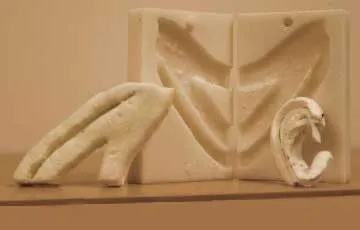
Wed, 09/30/2015 | UW Today
3-D printing techniques help surgeons carve new earsEngineering and UW Medicine researchers used 3-D printing to create a model that feels and acts like rib cartilage for realistic surgical practice. The innovation could open the door for aspiring surgeons to become proficient in the sought-after but challenging procedure.

Tue, 09/29/2015 | UW Today
Arsenic found in many U.S. red wines, but health risks depend on total dietTwo studies from EE professor Denise Wilson show red wines containing arsenic levels that exceed the EPA's allowed limit, but health risks depend on other high-arsenic foods in our diets.

Wed, 09/23/2015
UW and Shanghai Jiao Tong University forge international collaboration on smart citiesLooking forward to making Smart Cities a banner program for trans-Pacific collaboration, UW EE and Shanghai Jiao Tong University formed a partnership to improve quality of life through innovation. Smart city innovations use sensors, data analytics, and other technologies to elevate the safety, health, resilience, prosperity, and quality of life in urban areas, where an increasing number of people around the world live. Possible solutions could include sensors showing real-time air pollution data around schools, smart parking apps that cut down on circling and congestion, and GIS mapping technologies to manage water more efficiently.
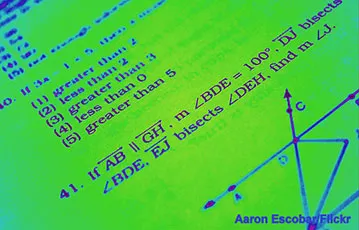
Mon, 09/21/2015 | UW Today
AI system solves SAT geometry questions as well as average human test takerUW CSE researchers collaborated on an artificial intelligence system that can solve SAT geometry questions as well as the average American 11th-grade student, a breakthrough in AI research. GeoS uses computer vision to interpret diagrams, natural language processing to read text, and a geometric solver to achieve 49 percent accuracy on official SAT test questions. If these results were extrapolated to the entire Math SAT test, the computer roughly achieved an SAT score of 500 (out of 800), the average test score for 2015.

Thu, 09/17/2015 | UW Today
A Q&A with Pedro Domingos: Author of "The Master Algorithm"Pedro Domingos, professor in CSE, is the author of “The Master Algorithm: How the Quest for the Ultimate Learning Machine Will Remake Our World.” In advance of his September 22 talk at Seattle’s Town Hall, he answered a few questions about the book. A popular science romp through one of today’s hottest scientific topics, the book is an essential primer on machine learning. It unveils the deep ideas behind the algorithms that increasingly pick our books, find our dates, filter email, manage investments and run our lives — and what informed consumers and citizens ought to know about them.
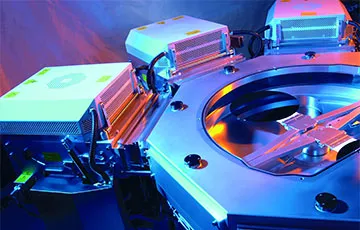
Wed, 09/16/2015 | UW Today
UW labs win $4.5 million NSF nanotechnology infrastructure grantNSF funding will support nanofabrication and molecular analysis for UW researchers, one-person startups and multinational corporations that otherwise can’t affordably or reliably meet their fabrication needs at commercial foundries. The UW and Oregon State University won a $4.5 million grant from the National Science Foundation to advance nanoscale science, engineering and technology research in the Pacific Northwest and support a new network of user sites across the country. The regional partnership was selected as one of 16 sites for a new National Nanotechnology Coordinated Infrastructure (NNCI) program. That network is designed to give researchers from academia, small and large companies and other institutions open access to university facilities with leading-edge fabrication and characterization tools.

Mon, 09/14/2015 | UW Today
UW, city of Seattle join 'Smart Cities' networkThe UW and city of Seattle have joined a national network of university-city partnerships that will work on "smart city" solutions. The MetroLab Network, announced by the White House on Monday, consists of partnerships between research universities with expertise in engineering, robotics and computer science and cities looking to be test beds for 21st century solutions. The partnership aims to marry expertise and knowledge from UW researchers — from engineers inventing new sensors to sociologists studying determinants of poverty to data scientists parsing problems in new ways — and the experience and learned wisdom of employees tackling day-to-day challenges of running a city.
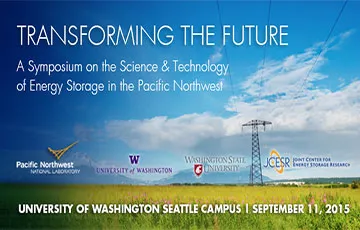
Tue, 09/08/2015 | UW Today
UW hosts Pacific Northwest energy storage symposium on Sept. 11
A more efficient and sustainable energy system hinges on the ability to store energy for when it’s needed most. On September 11, researchers, students, government regulators, energy entrepreneurs, utilities, and industry experts will gather at UW to discuss this topic at Transforming the Future: A Symposium on the Science and Technology of Energy Storage in the Pacific Northwest. The symposium will address energy storage research needs, commercialization opportunities and challenges, and strategies to finance energy storage technology deployment. Symposium sponsors are the UW Clean Energy Institute, Pacific Northwest National Laboratory, Washington State University, and the Joint Center for Energy Storage Research (JCESR).

Tue, 09/08/2015 | UW Today
New wearable technology can sense appliance use, help track carbon footprintA new wearable technology developed at UW called MagnifiSense can sense what devices and vehicles the user interacts with throughout the day. Applications include tracking individuals' carbon footprints, enabling smart home applications, and assisting with elder care. Next steps are testing MagnifiSense on a wider variety of devices and miniaturizing the device.

Mon, 08/31/2015 | UW Today
UW students put data science skills to use for social goodData scientists at the UW’s eScience Institute took a break from their typical work helping researchers and professors to incorporate cutting-edge technologies and data-based methods into their academic pursuits. Instead, they launched the Data Science for Social Good program which harnessed their expertise to address pressing urban issues closer to home. The program paired data scientists with students and local nonprofit and government partners. These interdisciplinary teams worked on projects to reduce family homelessness, improve paratransit bus service, foster community well-being and map better sidewalk routes for people with mobility challenges.
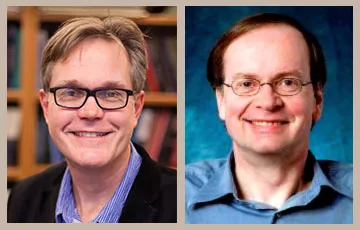
Tue, 08/25/2015 | UW College of Engineering
Per Reinhall sabbatical; John Kramlich to step inFrom Dean Mike Bragg
This fall quarter, Per Reinhall, chair of mechanical engineering, will take a well-deserved sabbatical leave. Professor John Kramlich has agreed to serve as acting chair of ME during Per's leave. John's appointment begins on September 16, 2015 and Per will return as chair on December 16, 2015.
I am grateful that John is willing to assume this role in service to the department and college. ME is making great strides in their identified areas of research which include energy, health, mechatronics, and advanced materials and manufacturing. I look forward to working with John as he continues to advance the important work taking place in ME by their faculty, staff and students.
Please join me in welcoming Professor Kramlich on board in September as acting chair of ME.
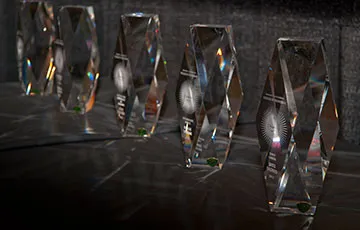
Mon, 08/24/2015 | UW College of Engineering
Nominate an Engineer
If you know an engineer who deserves recognition, we want to hear from you! The Diamond Awards honor outstanding alumni and friends who have made significant contributions to the field of engineering. Take a little time to nominate an engineer to join the distinguished ranks of Diamond Award honorees in one of 6 categories this year.
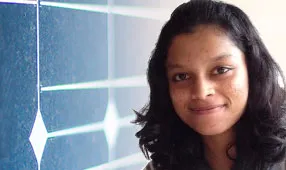
Mon, 08/17/2015 | University of Washington
Electrical Engineering student and UW Solar club project lead Shruti Misra is helping make solar power a reality
Shruti Misra, a senior in electrical engineering with a strong interest in sustainability, is committed to harnessing the sun’s energy — whether it’s through finding ways to control solar panels remotely or helping to oversee projects to get panels installed around campus.
This summer, she’s interning at Athena Energy, a startup that designs hybrid inverters for solar panels. Her role is to help make the panels "smart." Using her computer programming background, she’s finding ways for users to get data from the solar panels and control them via WiFi.
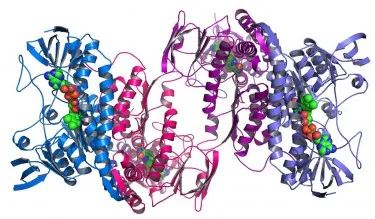
Thu, 08/13/2015 | UW Today
From protein design to self-driving cars: UW researchers win AI prize for new optimization approachCSE machine learning researchers developed a radically new approach to data optimization. Their paper won the top prize at the world’s largest artificial intelligence conference. The new UW approach outperformed standard optimization techniques, in some instances by many orders of magnitude. “In some ways optimization is the most important problem you’ve never heard of because it turns up in all areas of science, engineering and business. But a lot of optimization problems are extremely difficult to solve because they have a huge number of variables that interact in intricate ways,” said senior author Pedro Domingos, UW professor of computer science and engineering.

Wed, 08/12/2015 | UW Today
CO2 emissions change with size of streams and riversThe source of carbon dioxide emissions from streams and rivers has been unclear to scientists. David Butman, an assistant professor in CSE, has co-authored a study that shows the greenhouse gas appears in streams by way of two different sources — either as a direct pipeline for groundwater and carbon-rich soils, or from aquatic organisms releasing the gas through respiration and natural decay.

Wed, 08/05/2015 | UW Today
How makerspaces can be accessible to people with disabilitiesTo ensure places like UW's CoMotion MakerSpace are truly inclusive, ME's Kat Steele leads research on making communal DIY spaces accessible to people with disabilities.

Tue, 08/04/2015 | UW Today
UW workshop to explore Big Data solutions for scienceA workshop gathered 100 grad students to identify challenges, ideas, or solutions that data science could advance in their science or engineering fields.